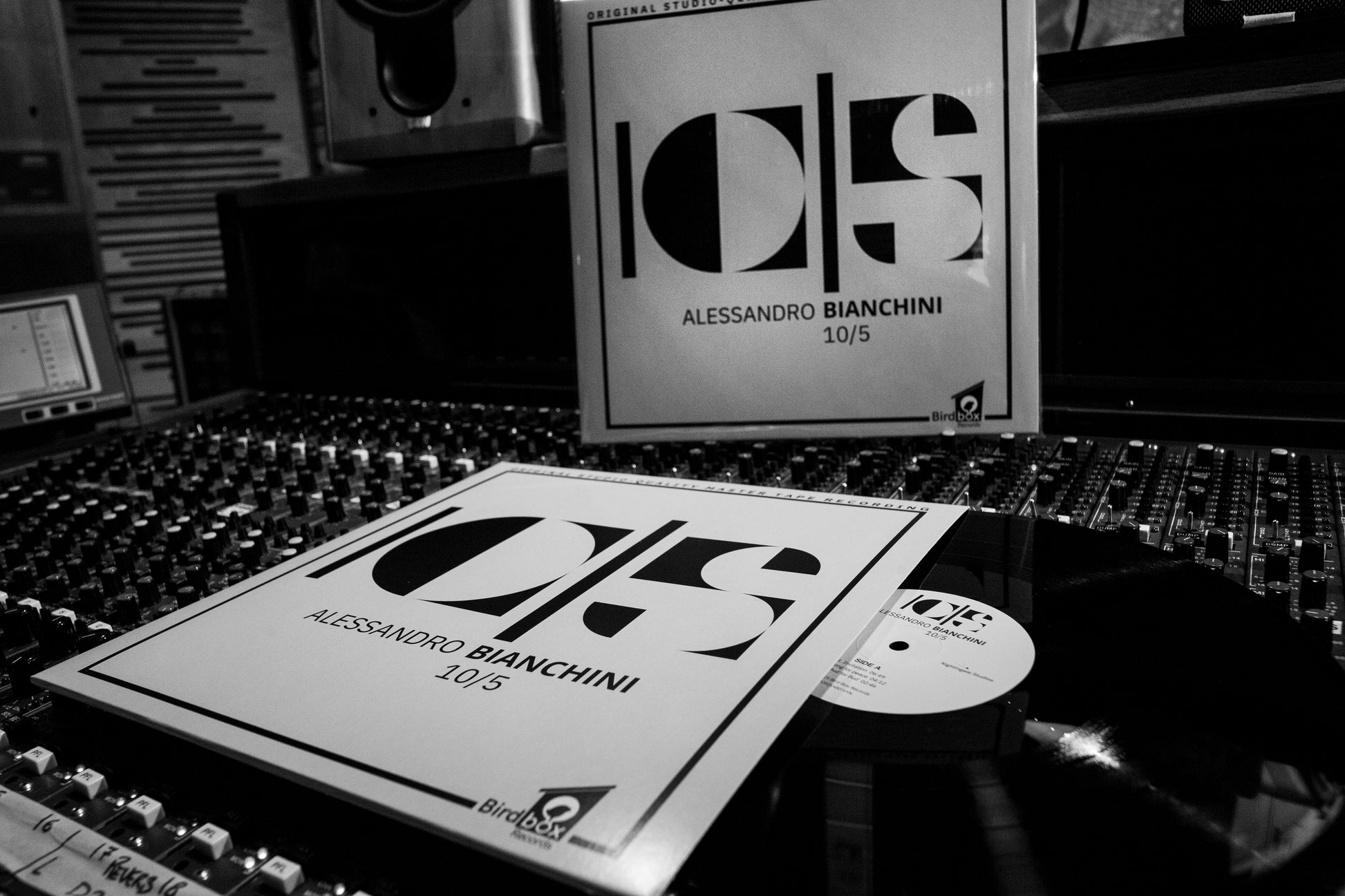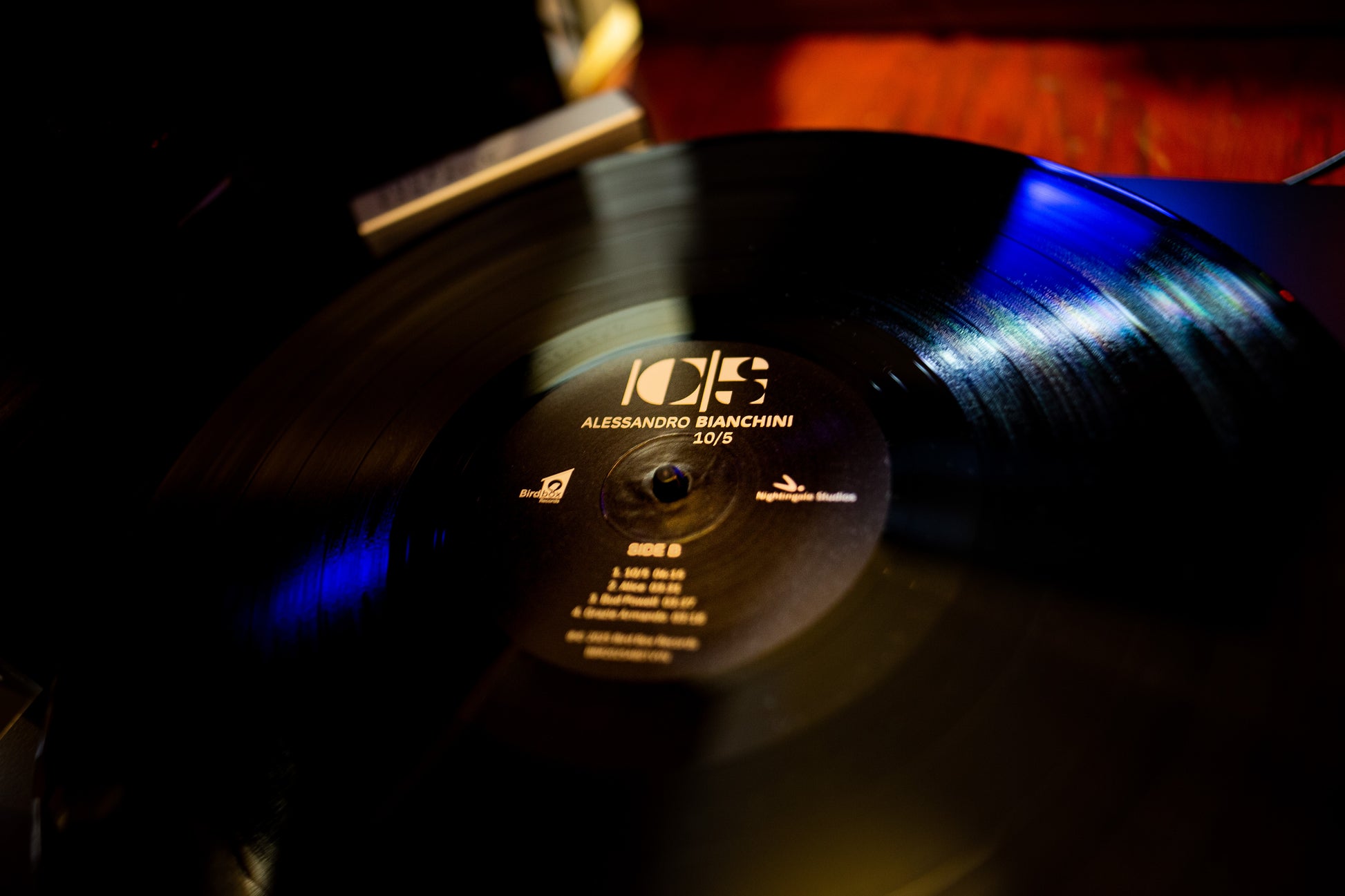BirdBox Records
Alessandro Bianchini - 10|5
Alessandro Bianchini - 10|5
Genere musicale: JAZZ
Esaurito
Impossibile caricare la disponibilità di ritiro
Alessandro Bianchini - 10|5 (BBR2023AB01)
Disponibile in: LP, CD, FILE HD 88.2kHz • 32bit
Tracce
1. Invitation (Bronislau Kaper)
2. Song for peace (Alessandro Bianchini)
3. Mud for Bud (Alessandro Bianchini)
4. 10 / 5 (Alessandro Bianchini)
5. Alice (Alessandro Bianchini)
6. Bud Powell (Chick Corea)
7. Grazie Armando (Alessandro Bianchini)
Line up
Alessandro Bianchini | vibraphone - marimba
Simone Brilli | drums
Marco Micheli | double bass
Special guest vocals: Beatrice Sberna (10/5; Alice)
Descrizione
10/5 è il risultato di una contaminazione tra generi e stili diversi, che riflette la formazione musicale di Alessandro Bianchini: dall’accademismo tipico della musica classica all’improvvisazione, attraverso le sonorità del jazz tradizionale.
Questi elementi segnano indelebilmente l’estetica e il linguaggio musicale del vibrafonista, che vengono poi impreziositi da una costante e meticolosa ricerca del dettaglio, tale da consentire l’identificazione delle sue composizioni.
Quando gli viene chiesto della sua musica dice:
"La scelta timbrica delle bacchette che cambiano a seconda del brano, l'idea di mettere insieme vibrafono e marimba, e l'enfasi quasi maniacale sulla dinamica sono gli elementi che, a mio avviso, conferiscono al disco un suono jazz, con note importanti e riconoscibili elementi volutamente raffinati. Un altro aspetto è sicuramente evidente agli ascoltatori e cioè la presenza di un elemento che personalmente metto sempre in primo piano e che è alla base dell'improvvisazione e dell'interplay: il Timing. È proprio il timing che mi ha permesso di creare un suono naturale , feeling quasi istintivo con gli altri componenti del gruppo: Marco Micheli al contrabbasso e Simone Brilli alla batteria".
Breve descrizione delle canzoni:
"Invitation" La scelta di arrangiare questo standard jazz nasce dal desiderio di includere elementi ritmici e timbrici di uno dei brani più significativi del repertorio bop. Questo standard è stato composto da Kaper, compositore di spicco della scena jazz americana del '900. Nonostante sia un pezzo del 1952, mi è sembrato subito molto attuale, quasi fosse una composizione contemporanea. L'arrangiamento crea momenti liberi nell'Intro e nell'Outro, che incoraggiano l'esplorazione musicale e conferiscono spontaneità all'improvvisazione e all'interazione tra i musicisti del trio. Fin dalle prime note si percepiscono subito le contaminazioni di musiche percussive, quasi preistoriche, tribali.
"Song for peace", Classic jazz waltz,ispirato ai suoni e all'interplay tipico del primo trio con pianoforte di Bill Evans, con Scott LaFaro al contrabbasso e Paul Motian alla batteria. Nel brano, inoltre, le linee melodiche sono senza dubbio influenzate da un altro compositore che ha avuto ed ha tuttora molta importanza nella mia estetica musicale, Johann Sebastian Bach.
"Mud for Bud" È nella sua essenza un omaggio ai due musicisti che hanno segnato i miei studi sul repertorio bebop: Charlie Parker e Bud Powell. Il primo sassofonista, il secondo pianista. La struttura armonica e la forma non sono altro che una contraffazione di "Donna Lee", una delle canzoni manifesto dell'era bebop, con un deliberato allontanamento dal tono originale. "Mud for Bud" è in Mib Maj al contrario di Donna Lee che è in Ab Maj. Nell'ultimo ritornello solista di vibrafono viene citata parte del tema originale della canzone resa famosa da Bird.
"10/5"è il brano che dà il nome all'album, traendo ispirazione dal repertorio di Egberto Gismonti, compositore per me ispiratore. Il titolo è dato dalla metrica che guida la musica, nel senso che può essere conteggiata e interpretata sia in 5/4 che in 10/16. A mio avviso è la composizione più intensa, essendo il risultato di una linea melodica creata su una clave in 5/4, che è sempre presente come groove nello sviluppo sia dei temi che dell'improvvisazione. Dal punto di vista compositivo la sezione A differisce dalla sezione B solo per un cambio di ritmo armonico, pur mantenendo invariata la linea tematica.
"Alice", dedicata a mia moglie, è una ballad tradizionale con interferenze di tensione post-bop. Questo brano vede la straordinaria partecipazione di Beatrice Sberna alla voce.
"Bud Powell" Questo standard jazz cattura due delle mie grandi passioni. Il linguaggio bebop e la maestria compositiva di uno dei miei pianisti preferiti del jazz contemporaneo, Chick Corea. La canzone è dedicata a Bud Powell, per me un artista infinito, ed è racchiusa in un album interamente dedicato al pianista scomparso prematuramente, intitolato "Remember Bud Powell" (Stretch label 1997).
"Grazie Armando"è un pezzo pensato e dedicato a Chick Corea ed è intriso di timbri e groove tipici del repertorio latin jazz. Il dinamismo della composizione è dato dall'alternanza nei temi dei due strumenti: il vibrafono e la marimba. L'introduzione viene suonata al vibrafono per poi passare alla marimba, dove il tema viene suonato nel registro più grave dello strumento. Questo crea un netto contrasto con l'assolo del vibrafono, rendendo l'ascolto fluido ma allo stesso tempo dinamico.
Cinque dei sette brani sono stati composti e arrangiati da Alessandro Bianchini, mentre il primo e il sesto brano del disco sono due standard jazz riarrangiati per la formazione del trio: vibrafono/marimba, contrabbasso e batteria.
Il disco è fortemente permeato dagli stilemi tipici del jazz tradizionale ed è il risultato di un linguaggio musicale e di un'estetica maturati negli anni dal vibrafonista.
Sonorità avvolgenti e ottime performance. Ottima registrazione.
Ottima musica, complimenti.
Lp da ascoltare sonorità a 360 gradi consigliatissimo
Share
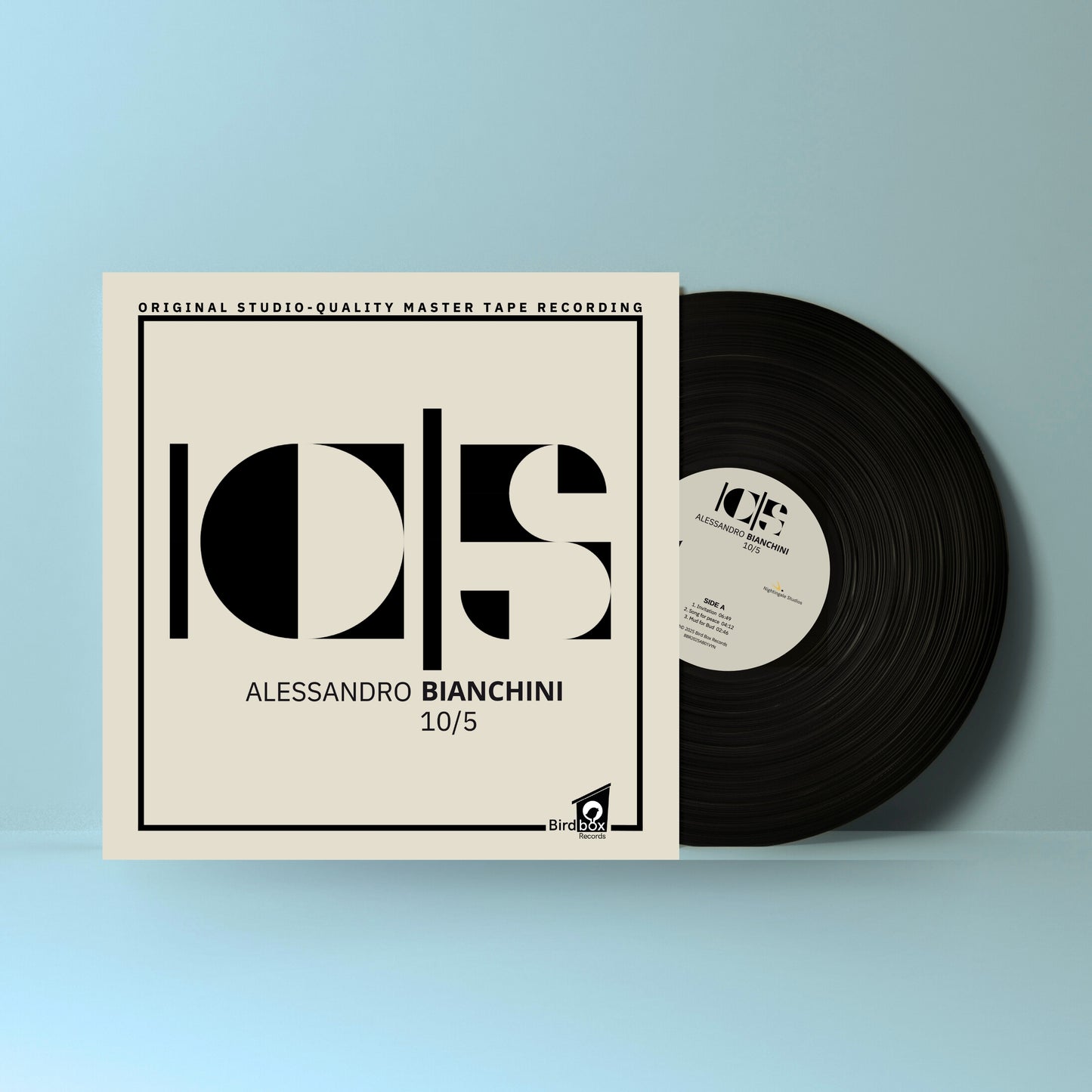


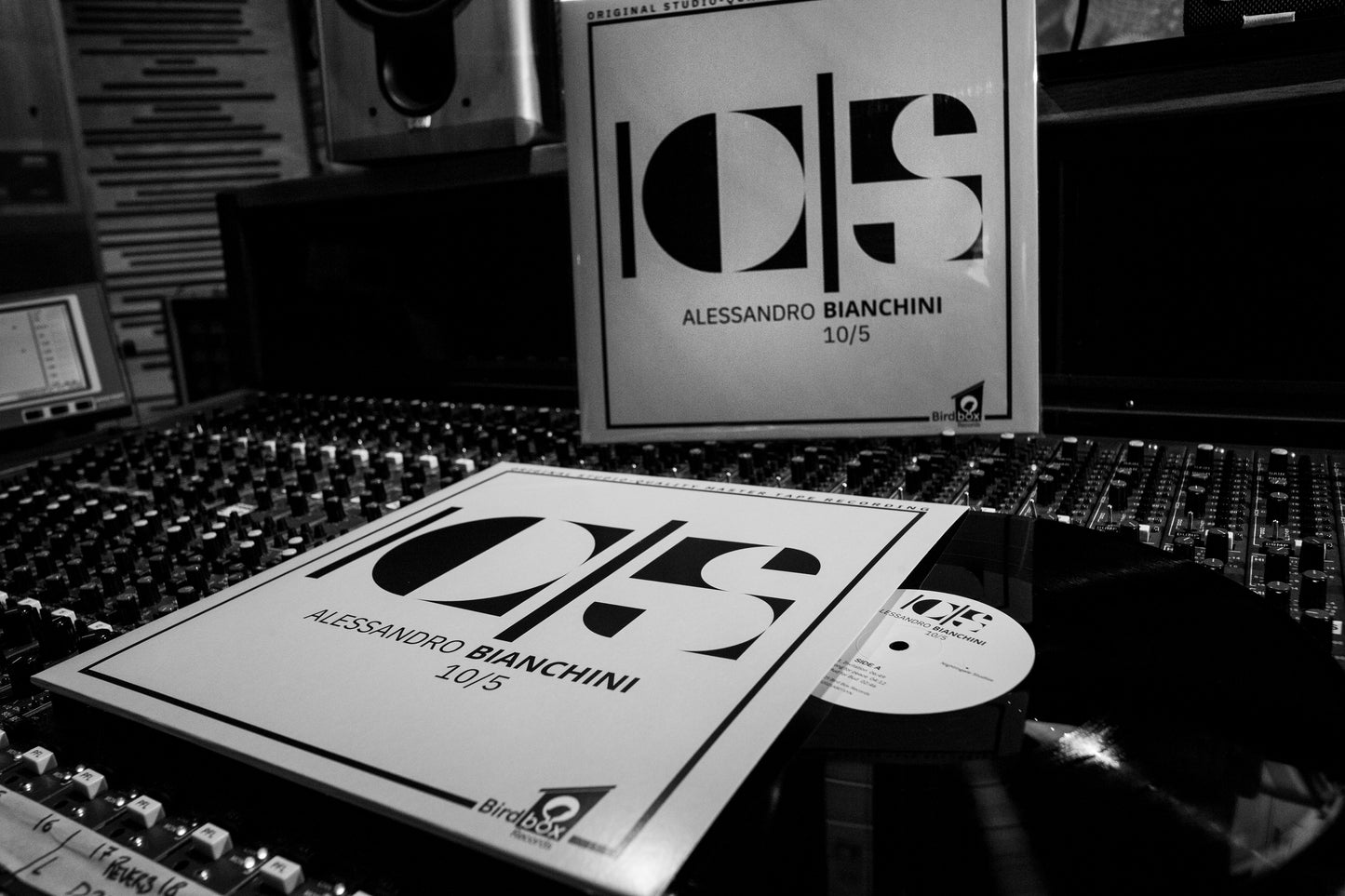




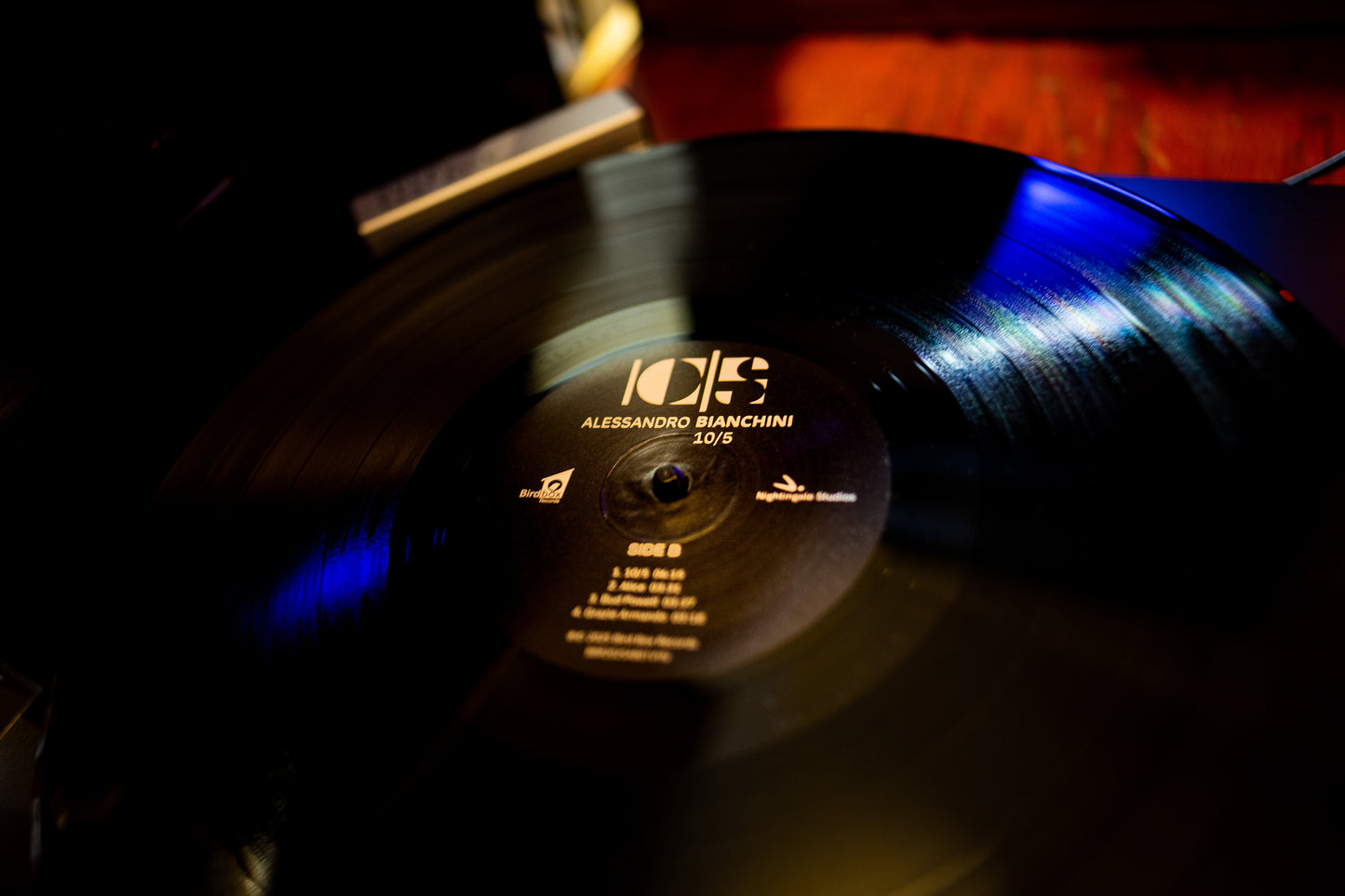
-

Spedizioni prodotti fisici
Spedizioni gratuite in Europa (UE), a partire da 4 articoli - Richiedere quatozione per i costi di spedizione per i paesi non UE
-

Consegna prodotti digitali
La consegna dei prodotti digitali avverrà direttamente sul sito e riceverai anche una email con il link per il download dei file.
-

Scrivi una recensione
Qui sopra puoi scrivere una recensione sul prodotto che hai acquistato, saremo felici di conoscere la tua opinione.



